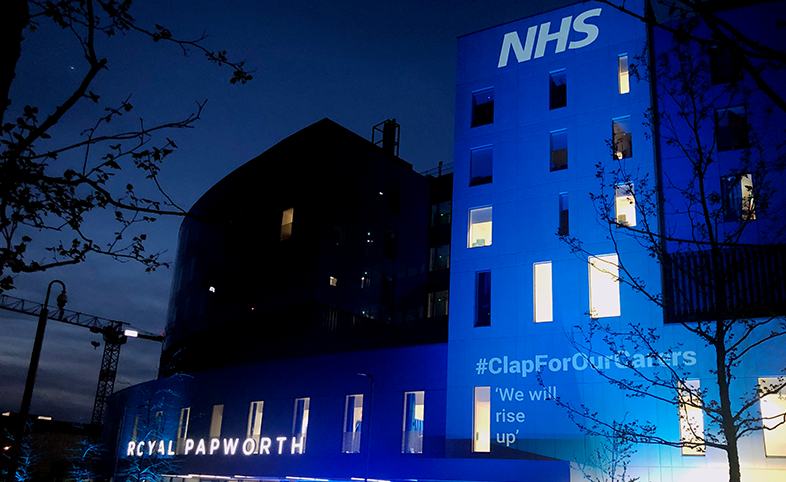We spoke to Fiona Claridge, Regional Lead – London and East at NHS Confederation, about what NHS Reset means for innovators amidst the COVID-19 pandemic
During the coronavirus pandemic we have seen innovation rolled out across health and care at an extraordinary pace, presenting an opportunity for frontline staff to affect change supported by a leadership culture focused on moving quickly.
We’ve seen incredible progress in using technology and delivering services differently. But as we moved beyond the initial emergency response to the pandemic, we wanted to understand what was working well and why, and what positive changes could be taken forward beyond the COVID-19 period. This gave rise to the NHS Reset campaign, which launched in May. As part of the initiative, we teamed up with the Health Innovation Network and Health Foundation to explore the explosion of innovation and new ways of working. We partnered with them because of their expertise in quality improvement, implementing and evaluating rapid transformation, and because we share the goal of understanding what can be learned from the health sector’s response over the last ten months and how we can apply this as we innovate in future.
I recently joined Health Innovation East’s East of England regional innovation and transformation showcase to talk about NHS Reset and was inspired to see providers and commissioners share how they had worked together to respond to the pandemic and what they had learned from it. But what does this mean for innovators?
There has been a cultural shift
As we talk to healthcare leaders about NHS Reset, it is clear that the COVID-19 response has shown what can be achieved when we are forced to do things differently. Many clinicians are looking at innovation in a different way, having been empowered to drive the necessary changes to continue caring for patients during the pandemic. Similarly, leaders have seen reconfiguration done quickly when the right resources are provided and the red tape is reduced. If you can show clinical staff that your innovation is effective, their voice is more influential than it was a year ago in convincing service managers to try something new.
Patients have never been so open to services being delivered differently
The drive to reduce reliance on hospital outpatient appointments predates the pandemic; the Long Term Plan pledged to reduce unnecessary face-to-face outpatient appointments back in January 2019. However, progress has sometimes been slowed by, amongst other factors, a concern that patients might be resistant to a change in how they receive care. When we speak with NHS Confederation members, we hear that many patients whose appointments were moved to telephone, online or more community-based models out of necessity are now open to continuing with this approach.
Digital literacy is still, however, an issue which needs considering and there will always be services for which a hospital-based or blended approach is more appropriate. But there’s huge opportunity for innovators with solutions that continue to empower patients to be treated in their preferred setting and that do not deepen health inequalities. It has always been vital that innovators engage patients in developing solutions, particularly when it involves a change to their behaviour. If you have a strong patient case study and can show that patients are open to a new approach, it’s a very effective way to alleviate the concerns of commissioners and providers.
It’s not all digital
One of the biggest challenges of the initial COVID-19 response was building the NHS and local government’s infrastructure which innovation rollout was reliant on. This infrastructural investment has massively improved the capacity to adopt digital tools and provides opportunity for many innovators.
However, rolling out new tools such as Microsoft Teams and online consultations required more than just licences and a download – in many cases it meant an overhaul of IT hardware, changes in how staff communicate with each other, pathway redesign and in some cases organisational restructure.
As an innovator, you need to know what this means for those who need to make changes to use your innovation. Providers will expect you to know where your innovation supports patient care and your value proposition in 2021 may not be the same as it was in 2019. Build up from the pathway and be clear where you fit in.
Some organisations are suffering transformation fatigue
Rapid change can be expensive and stressful. Whilst most of our members have described their experience of COVID-19 innovation positively, it didn’t fix every problem and many services had to be paused. The NHS is still dealing with coronavirus, alongside increased waiting lists, the mental health and public health implications of lockdown and usual winter pressures. NHS staff have been rightly celebrated for their continued commitment and heroism, but for some it has taken a toll their mental health.
We need to be conscious of what this might mean for organisations, staff and patients’ appetite for further change. Many of our members have told us they are in a period of consolidation and aren’t currently looking for further innovation. A ‘no’ might really just mean ‘not now’.
Where will you fit in when we return to a new normal?
The purpose of NHS Reset is ensuring that we learn what we can from the health and care sector’s response to the pandemic and a large part of this is evaluating how effective each innovation has been. This is particularly difficult due to the unprecedented nature of the situation. Many services had to stop. The usual reconfiguration processes were relaxed. The lockdown and NHS goodwill may mean patients responded differently than they might in the future.
To make the most of advancements made in rolling out new ways of providing care, there needs to be some backtracking as part of a return to a new normality. If you are an innovator who has supported healthcare during the pandemic, you may have had less patient representation than you would have otherwise required. Procurement may have been fast-tracked. Admin burden might increase and providers’ priorities may be less focused on COVID-19.
You need to ensure now that you have built in effective patient involvement (see our NHS Reset report on developing a new relationship with people and communities) and clinical engagement processes, with a robust evidence base and a clear value proposition to explain where you fit when services settle into whatever the new normality looks like.
Read the report ‘What we have learned so far: Best practice and innovation during COVID-19‘ and stay up to date with NHS Reset on the NHS Confederation website.
About Fiona
Fiona Claridge is Regional Lead for London and the East at the NHS Confederation. Fiona joined the Confederation in August 2018 and works with NHS Confederation members across London and the East.
Prior to joining the Confed Fiona was Head of Stakeholder Communications at London Ambulance Service, leading a team to work with senior stakeholders internally and externally. Fiona spent 10 years working at the Big Lottery Fund in a range of roles including leading the external relations team, heading up the South East team and working to support stakeholders and grant holders across South East England and working on European funding to make it more accessible to the voluntary and community sector.
You may also like…
Share your idea
Do you have a great idea that could deliver meaningful change in the real world?
Get involved


